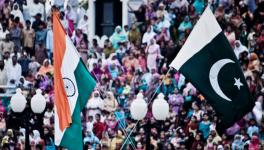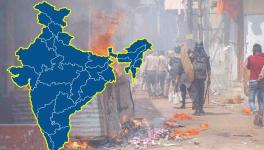The Perils of Dowry in Kashmir
File Photo.
Five months after his younger sister was allegedly killed, I met Muhammad Ashraf at his home in Badaran Aishmuqam. The house, an old tall building with distinct Kashmiri architecture, stands apart in the neighbourhood. Ashraf was sitting on his verandah when I entered the compound.
"She always complained that her in-laws are demanding dowry, especially her husband, a tailor by profession," Ashraf recalls. The dowry would be in the form of a fridge, washing machine, television, copper utensils or sometimes cash. This demand would grow after every visit to her parent's house. On March 5, around 2 am, Ashraf got a call from his brother-in-law, Mushtaq Ahmad Lone, who told him that an accident had occurred at his house.
"I lost my senses, this phone dropped from my hand, and I ran to find my sister." He reached the district hospital in Anantnag, where he saw his sister bruised and battered on the bed. Later she was referred to SMHS hospital in Srinagar due to the major injuries she had sustained.
Neelam (name changed) was born in January 1987 to a lower-middle-class family; her father is a farmer, and her brother is a government teacher. They had a huge family to feed. Amid the limited income, Neelam managed the whole house before marriage. Ashraf describes her as a strong-headed girl.
Neelam before the accident. Source of Picture. Neelam's Brother
"She used to take care of everything here, from farming to kitchen works; she would perform every task perfectly," Ashraf said when asked about her educational qualifications.
"She never went to school, but she was very sensible and brave. No one after talking to her would think she hasn't been to a school in her life," Ashraf announced.
There isn't much information on how she was burned. However, according to the doctor, kerosene was spilt throughout her body. Her in-laws denied the allegations; they said she (Neelam) spilt the kerosene on her body.
"She was a brave woman. A powerful woman, she cannot kill herself," Ashraf says (as if he has to prove it to someone). Neelam left two children behind who repeatedly ask their relatives about the whereabouts of their mother.
Neelam is one of the countless victims of domestic violence in Kashmir. Although Kashmir is a police state, dowry has never made its presence felt. It has remained a secret underbelly. The state is reluctant to check the menace and is busy with other activities while ordinary people have normalised its functioning and often celebrate it.
Dowry, as a practice, has never been undervalued; it has fathomed immense support from people across regions. People celebrate and practice dowry with great excitement, and in the bid, the underprivileged class suffers the most. Parents die a million death before they marry their daughters. They remain in fear till the boy's family arrives and asks for dowry.
In a predominantly Muslim society, dowry is considered a social evil by all standards in Kashmir. Still, it has become a part of the institution of marriage. Even before the nuptial knots are tied, the dowry is settled between the two families, which somehow help to provide permanency to the relationship. It can constitute anything, from jewellery to cash, gadgets, clothes and electrical appliances to cars.
Dowry in Kashmir has no particular shape or size; it can come in anything that has a commercial value. That is not to say that it is not despised in certain sections, but essentially it has penetrated society incrementally. Often, it is done in the name of gifts. Even marriages in Kashmir are a big hassle now. It has merely been restricted to a string of wealth exposition and desired ostentation. The extravagant marriage ceremonies, the exchange of freebies, unwonted tapestries, and the reprehensible trend of serving more than twenty dishes in Kashmir added fuel to the ongoing fire. It augmented the dowry tradition and made people like Neelam vulnerable, who tend to suffer at the hands of their in-laws.
The history of the dowry system might be old or conservative, but its enigma is too strong that no matter how complex the rules are, its practice has never really receded. Dowry or Dahej, when it comes to Indian societies, happens at an unprecedented rate. Recently, Ayesha's case has been an eye-opener, but the menace of dowry persisted.
According to the NCRB (National Crime Records Bureau), a woman becomes a dowry death victim every hour. In the year 2016 alone, 7628 dowry-related deaths were reported, as per NCRB. During the lockdown, Kashmir Reader (news daily in Kashmir) identified and investigated five case studies in September 2020 wherein they found that women are undergoing tremendous mental and physical harassment. They found out in these cases that dowry is a widely practised cultural menace, and people endorse it. In most cases, the husband tortures, abuses and thrashes the wife for not bringing dowry.
Greater Kashmir (one of the noted dailies in Kashmir) has also investigated dowry-related cases. In the data available until 2017, the state had recorded 15 dowry deaths in the past three years. Nearly 639 cases were registered, and 1108 people were arrested in 2014. From 2015-2017, more than 1000 dowry-related cases were registered. J&K police also arrested 583 persons, and 422 cases of domestic violence were recorded.
In the recent past, especially during the lockdown, media reports about domestic violence incidents continued to highlight the ugly side of masculinity and patriarchy. Neelam's death was one of the many cases related to domestic violence linked to dowry reported in Kashmir. Her young age and the two children she left behind started a debate online, but that died down in a matter of days.
One incident that roared across Kashmir was when a girl from Rajouri was allegedly murdered by her in-laws. Her parents alleged that she was subjected to domestic violence. Another case came from Bandipora, where a woman allegedly died by suicide. Her family accused her in-laws of "killing her for dowry." Bashir Ahmad Khan, the victim's father, said that her husband and his parents are responsible for her death as they have been harassing her for dowry. Two little children survive the woman.
Neelam was married in 2012 to a man chosen by her parents. According to Ashraf, "The first two years were good; they used to fight, but that never became an obstacle in their married life. Only after she gave birth to a baby girl, the fights became more frequent and violent. Neelam's in-laws taunted her that you got nothing from your parent's house; your father didn't offer you anything. Look at other girls, they brought huge property."
To end her terrible ordeal, Ashraf decided to bring her sister and niece to his home.
"When I went to get her, they even abused me," Ashraf says. After six months, the couple reconciled, and her husband took her back. Ashraf says that they were elated when her sister decided to go back to her husband's house. Her husband even apologised for his mistakes. Soon after, Neelam gave birth to another child, a baby boy. The birth of a boy might have led Neelam to believe that things would get better, but there was no respite. No sooner, Neelam again faced domestic violence.
"I cannot tell you what words that man (Mushtaq) used for his wife when he talked to my father. We were ashamed of ourselves that how could we marry our daughter to such a horrible man," Ashraf said in a soft-yet-concerned tone.
On the night when Neelam was allegedly killed, Ashraf remembers that he had a call from her earlier in the day.
"She called me that day at 11:30 pm, telling me that they have started the demand again. She asked me what I am going to do." Ashraf told her that he would come to pick her the next day. After that, Ashraf called her husband, who said that his sister was "abnormal".
Neelam battled for her life for a week. During that time, she was able to give testimony to the police. "Police didn't file a case against her in-laws on our complaint. But it was Neelam who narrated everything that happened to her on the day of the incident. She then left us from this material world," Ashraf said while battling his tears. Soon after, Neelam's husband and her other in-laws were arrested.
Dowry is a menace in Kashmir. Another incident involving a girl named Sameera (name changed) is gut-wrenching. Sameera lives in the outskirts of Tulmulla Ganderbal, which is 20 km away from Srinagar. She has been a victim of both dowry and domestic abuse and belongs to a lower-middle-class family. Her mother died last year, and her father has been bedridden for the past five years. Her father, a labourer, has rented his two-storey building for livelihood. Sameera, in the interview, mentioned how her in-laws refused to accept her daughter.
"They always wanted a boy. When I gave birth to a girl, they didn't even touch her," said Sameera.
As Sameera belonged to a low-income family, she always received taunts and sarcastic statements from her mother in law. "You have brought nothing; you gave us a girl child. The next child should be a boy. Otherwise, my son will divorcé you," Sameera said in a failing tone.
In a patriarchal society, women play an instrumental role in the development and dissemination of male dominance. Women in the house are the biggest reason for the development of domestic patriarchy. Especially in a place like Kashmir, women demand dowry more than men; they play a significant role in convincing their sons for the dowry. Sameera said that after her mother's death during the lockdown, she had to come to her parent's house in 2020. Since then, she hasn't returned to her in-laws.
"Not only they didn't come here to see my little daughter or me, but they also snatched my little son, who is not even six."
Sameera recounted that after she had given birth to a boy, her in-laws would never leave him, but their behaviour towards her still didn't change.
"My husband wanted me to work like a machine. Not once did he take me to a doctor for a checkup even when I was in pain."
The pain, the agony, and the trauma that Sameera experienced shook her to the core. She even attempted to end her life after the birth of her daughter.
"After the suicide episode, I felt desensitised as after anaesthesia, my body was numb, and the mood was zestful, but my husband didn't stop from abusing and harassing me."
Sameera, who now lives in her father's house, doesn't want to return but wants her son to be returned who her in-laws forcibly snatched from her. In one of the conversations, she mentioned, "How I can go back? That man can kill me. He has killed my child. I have aborted one child unwillingly because he didn't want it."
Most women's tragedy in marriage is that they lose the right to keep or abort the child; the child's father decides that. The fate of most women in Kashmir depends on their male counterparts, even if that means aborting or being unwilling to keep the child.
So much has been written and deliberated about dowry and domestic violence, how they're social evils, their impact on society's fabric, and how they deteriorate our cultures. Still, the rate, instead of going down, has increased.
Syeda Afshana, an Assistant Professor at the University of Kashmir who teaches media studies, said, "Dowry system is, of course, a sick tradition that we need to discourage. What we practice in Kashmir is contrary to our beliefs. It is ordained unto the groom and his family to give dower (Mehar) to the bride, as much as possible, without putting any limitations on it. However, in most marriages, the bride has to get dowry along while going to the groom's home. In many cases, dowry is demanded by the family of the groom. We have witnessed many women facing dowry-related domestic violence to the extent that it has even resulted in the bride's death in some cases. Lack of proper education and societal sanction of such practices has added insult to the injury. People in Kashmir have started accepting glamorising weddings while emulating alien cultures. In certain cases, we have witnessed a bride's family dabbling in an extreme extravaganza on the marriage ceremony and bidding farewell to their daughter along with lots of dowry in the form of cash and kind to her in-laws."
She further added, "This practice, perpetuated by the concept of materialism, is another evil that is proving detrimental for solemnising marriages of women belonging to weaker sections of the society. This has drastically contributed to late marriages in recent years. The best way out of this social disaster is to return to the constitution book that encourages us to solemnise marriages with austerity. One more important thing is rather than giving a smaller portion of the dower in the form of Mehar and keeping a major portion as gifts (Thaan), the whole dower from the groom's family, as commanded in Sharia, should be kept as Mehar. Younger generations need to be sensitised about the essence of this sacred relationship and the teachings of their faith while solemnising the marriages."
This story has been reported under the National Foundation for India (NFI) fellowship for Independent Journalists.
Get the latest reports & analysis with people's perspective on Protests, movements & deep analytical videos, discussions of the current affairs in your Telegram app. Subscribe to NewsClick's Telegram channel & get Real-Time updates on stories, as they get published on our website.
























